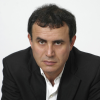Post-Olympic Powershift: The Return of the Middle Kingdom in a Post-American World
Shanghai-When scholars from all across China gathered here recently to assess their country's role in the afterglow of the Olympics, their pride shone as bright as the waxing Autumn Festival moon. More than a patriotic triumph, the "best games ever" were seen as a knockout blow against a West on the wane after 500 years. To those charged with thinking professionally about China's future, the Beijing Olympics marked the advent of a new era in which the Middle Kingdom emerges again out of the mists of history-not as a hegemonic superpower, but as the superior civilization in a post-American world.
Whether one agrees with this view or not, it is unquestionably the driving spirit behind the powershift in the world order today and bears a close hearing in the West. It is, after all, what the Chinese tell themselves.
Among the political heavyweights at the third annual World Forum on China Studies, convened in a monumental Stalin-era exhibition hall now dwarfed by a towering sea of neon-rimmed, Godzilla-scale skyscrapers reminiscent of Blade Runner in the night haze, was Zheng Bijian. He is the former vice chair of the Central Party School, confidant of the current Communist Party leadership and author of China's "peaceful rise" doctrine.
Zheng argued that China's dream of escaping Western subjugation since the Opium War in 1840 had finally been realized in the "new awakening" of the last 30 years of "reform and opening up." Now awakened, the whole nation was engaged in sorting through "a hundred schools of thought" about the way ahead in a globalized economy. Indicative of the millennial time frame in which the Chinese see themselves, Zheng compared this historical moment to the Spring and Autumn Period (770-476bc) and the Warring States Period (475-221bc).
In the view of this party ideologist, an awakened China had proven the superiority of its way over the grand Western theories of a "clash of civilizations" and triumph of the West at the "end of history" through solving the "riddle of the century" by abruptly lifting hundreds of millions of its people out of poverty and underdevelopment. This success had proven, beyond any empirical doubt, the neo-Confucian wisdom of Deng Xiaoping to "seek truth from facts" and, step by step, like feeling one's way across a shallow river, "constructing socialism" in tune with local characteristics and rising in peaceful development. This offers the world a third way between the models of conflict or domination that emanate from the Western mind.
The reawakened Middle Kingdom, according to Zheng, "would not be puffed up with self-importance, divorcing itself from economic globalization and modernizing with the door closed." Nor would the new China "belittle itself" with dependence on the West but "act independently with the initiative in our own hands."
This new China, Zheng argued, would resist the path of the rise of the Western powers "with their colonialist plundering of the world's resources in the process of industrialization" as well as the ill-fated paths of the "military nations like Germany and Japan who waged wars to reshape the world." The new China would also avoid seeking superpower hegemony like the former Soviet Union "under the cover of the so-called world revolution." Instead, based on its remarkable success, the new China would seek an "open, non-exclusive and harmonious" relationship with all others to "mutually open up the route to world development."
Lest the resurgent Confucian sentiments behind this worldview be lost on the rest of the world, other prominent thinkers underlined the civilizational character of China's project.
Zhang Xianglong of Beijing University's philosophy department highlighted the "non-universalist" nature of Confucianism and thus the emphasis on truth being grounded in particular, concrete circumstances instead of universally applicable standards-whether the Western concept of universal human rights and democracy or the Marxist idea of universal laws of development. Because of its non-universalism, Confucian civiilization seeks "pragmatic discourse" with others following their own path rather than seeking to lord it over them.
It is easy to see in this brief sumum of the Confucian worldview the basis of all the slogans repeated ad nauseum by China's leaders today-"seek truth from facts," "socialism with Chinese characteristics," "peaceful rise" and "harmonious society." Reinforcing Zheng's claim of China having found a harmonious third way, Zhang argues that a "clash of civilizations" or the "end of history" can "only occur when universalist cultures encounter each other or prevail over each other. When two non-universalist cultures meet there may well be friction, but total warfare that aims at mutual annihilation is generally avoided. When, however, two universalist cultures meet, even though they may compromise and negotiate to ensure their temporary safety, in the long run they are in principle engaged in a to-the-death struggle."
Indeed, Zhang notes, Buddhism and Taoism coexisted for millennia in China. Other scholars even posited that Confucian virtues constitute China's "soft power."
Tan Chung, who for many years was the dean of the Centre for East Asian Studies at Jawaharal Nehru University and the Delhi Institute for Chinese Studies, views the Beijing Olympics not just as the coming-out party for the new China, but for the reappearance of the Confucian sensibility in world affairs. "The magnificent success of the Beijing Olympics," he says, "objectively marks the transition of the world from the 'geopolitical paradigm' to the 'geocivilizational paradigm' in which China takes the lead. In Tan's view, China, as has been the case historically, is not interested in maximizing power through the conquest of territory or ideological space like a superpower, but in the integration of civilizations through harmonious coexistence.
Tan is particularly struck by the 5000 years of harmonious coexistence between India and China-marred only by the 20 years between 1958 and 1978 when both civilizations were infected with Western nationalist notions-as well as by the fusion of cultures in Central Asia known as "Serinda" or "Indochina" in Southeast Asia.
"In the Western Hemisphere," as Tan labels it, "all the brilliant ancient civilizations like Babylonia, Egypt, Greece and Rome have become ruins without being handed down. This was because there was no 'geocivilizational paradigm' among them. The 'geopolitical paradigm' pushed them to scramble for space and indulge in mutual destruction. The basic difference between Eastern and Western hemispheres lies here."
For Tan, the success of the Olympics will allow China to "bid farewell to the sorrowful feelings of history, discard the pursuit of power and return to its civilizational vocation of advocating a culture of harmony." He cites the famous adage of Confucius in the Analects that the "Qi" state-which pursues power-is to transform into the "Lu" state-which seeks higher cultural development-and ultimately transform into the "Tao," or truth-prevailing state. (On the mundane level, Tan already sees that, filled with pride and esteem in the Olympic aura, Chinese are smoking and spitting less.)
Of course, no one need be naive about what the influence of a neo-Confucian China means for Western values in the coming century. For example, Zhang Wei Wei, famous as one of Deng Xiaoping's favorite interpreters, confidently predicts that as power shifts East, the "tired" old debate in world affairs about "democracy vs. autocracy" that so irritates the Chinese authorities will, following the highly successful Chinese experience, be replaced by a more pragmatic and less conflictive discourse about "good governance vs. bad governance."
And it goes without saying that the exercise of Confucian authority is not beyond the brutal enforcement of internal harmony against rebellious children, as everyone remembers from Tiananmen Square in 1989.
But it would be equally foolish for the West, whether out of ignorance or cynicism, to dismiss the profound civilizational impulse behind China's rehabilitated self-image. For anyone who cares to look, it is written all over the proud face of post-Olympic China.
Copy Right: New Perspectives Quarterly, NPQ
If you wish to comment on this article, you can do so on-line.
Should you wish to publish your own article on the Facts & Arts website, please contact us at info@factsandarts.com. Please note that Facts & Arts shares its advertising revenue with those who have contributed material and have signed an agreement with us.


















